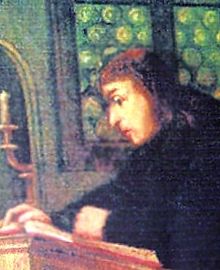- Maciej Miechowita
-
Maciej Miechowita (also known as Maciej z Miechowa, Maciej of Miechów, Maciej Karpiga, Matthias de Miechow) (1457 – 8 September 1523) was a Polish renaissance scholar, professor of Jagiellonian University, historian, chronicler, geographer, medical doctor (royal physician of king Zygmunt I the Old of Poland), alchemist[1], astrologist[2] and canon in Cracow.
He studied at the Jagiellonian University (also known that as the Cracow Academy), obtaining his master's degree in 1479. Between 1480-1485 he studied abroad. Upon his return to the country, he became a professor at the Jagiellonian University, where he served as a rector eight times (1501–1519), and also twice as a deputy chancellor of the Academia.
His Tractatus de duabus Sarmatiis (Treatise on the Two Sarmatias) is considered the first accurate geographical and ethnographical description of Eastern Europe. It provided the first systematic description of the lands between the Vistula, the Don and the Caspian Sea. This work also repeated after Jan Długosz and popularised abroad the myth of Sarmatism: that Polish nobility (szlachta) are descendants from the ancient Sarmatians[1].
 Maciej Miechowita
Maciej Miechowita
His Chronica Polonorum (Polish Chronicle) is the developed, larger treaty about Polish history and geography. Contra pestem sevam regimen and Conservatio sanitatis are his two printed medical treaties, about how to combat epidemics and on benefit of sanitation.
He has also written other works, much of which was published only as manuscripts and not printed during his lifetime, like his biography of Saint John Cantius.
Selected works
- Contra pestem sevam regimen, print. 1508;
- De sanguinis missione, print. 1508;
- Conservatio sanitatis, print. 1512;
- Tractatus de duabus Sarmatis Europiana et Asiana et de contentis in eis, print. 1517;
- Chronica Polonorum, print. 1919, 1921.
See Also
- List of Roman Catholic scientist-clerics
References
- This article incorporates information from the revision as of 23 February 2006 of the equivalent article on the Polish Wikipedia.
- ^ Andrzej Wasko, Sarmatism or the Enlightenment:The Dilemma of Polish CultureSarmatian Review XVII.2, online
Categories:- 1457 births
- 1523 deaths
- Alumni of Jagiellonian University
- People from Miechów County
- 16th-century Latin-language writers
- Jagiellonian University faculty
- Polish astrologers
- Polish geographers
- Polish historians
- Canons of Kraków
- Polish writers
- Roman Catholic cleric–scientists
- Rectors of the Jagiellonian University
- Polish writer stubs
Wikimedia Foundation. 2010.

